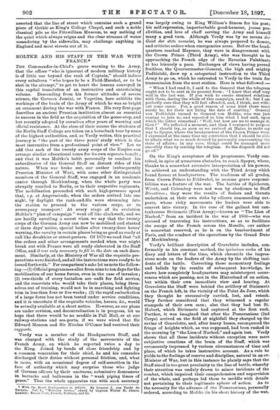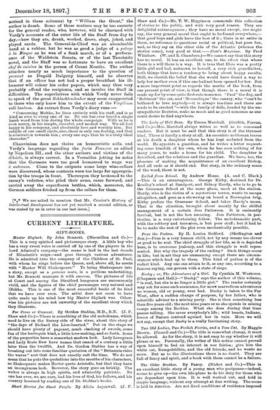MOLTKE AND HIS STAFF IN THE WAR WITH FRANCE.*
THE Commander-in-Chiefs grave warning to the Army, that the officer "who is ignorant of modern military history is of little use beyond the rank of Captain," should induce every subaltern "who hopes to be a Field-Marshal, or to be shot in the attempt," to get to heart the lessons conveyed in this capital translation of an instructive and entertaining volume. Descending from his former altitudes of severe science, the German Jomini, or Vegetins, here exhibits the workings of the brain of the Army of which he was so bright an ornament during the war with France. His very first page describes an ancient Prussian institution almost as essential to success in the field as the acquisition of the goose-step, and but recently adopted by ourselves after years of warning and official resistance. At the close of their course the students of the Berlin Staff College are taken on a horseback tour by some of the highest authorities, and, as Verdy writes, this practical journey is "the part of the three years' study which is the most instructive from a professional point of view." Let us add that each of the twenty army corps of the Empire can arrange similar educational tours for its own separate benefit ; and that it was Moltke's habit personally to conduct his subordinates of the General Staff on distant rides of this nature. When war broke out, our author (subsequently Prussian Minister of War), with some other distinguished members of the General Staff, was engaged in an academic canter through Mecklenburg, when the whole party was abruptly recalled to Berlin, or to their respective regiments. The mobilisation proceeded with such high-pressure speed that, e.g. at Angermiinde, when the orders arrived late one night, by daylight the rank-and-file were streaming into the station to proceed to the various corps, or to accompany transport ! At every stage of its evolution Moltke's "plan of campaign" went off like clockwork, and we are hardly unveiling a secret when we say that the twenty corps of the German Army can now be mobilised and started at three days' notice, special bodies after twenty-four hours' warning, the cavalry in certain places being as good as ready at call like droshkies or street-porters. Of 1870 we read that "all the orders and other arrangements needed when war might break out with France were all ready elaborated in the Staff Office, and it was only necessary to fill in the date on each docu- ment. Similarly, at the Ministry of War all the requisite pre- parations were finished, and all the instructions were ready to be issued forthwith." For comparison's sake let us note the follow- ing:—(1) Official programmes allot from nine to ten days for the mobilisation of our home forces, even in the case of invasion; (2) two-thirds of every battalion are unfit for field service, and the reservists who would take their places, being them- selves out of training, would not be in marching and fighting trim in less than four or five weeks ; (3) the rapid embarkation )f a large force has not been tested under service conditions, and it is uncertain if the requisite vehicles, horses, &c., would be actually available at a short notice. However, as our plans are under revision, and decentralisation is in progress, let us hope that there would be no muddle in Pall Mall, or at our railway-stations and sea-ports, if we were wired that Sir Edward Monson and Sir Nicolas O'Conor had received their rapports.
Verdy was a member of the Headquarters Staff, and was charged with the study of the movements of the French Army, on which he reported twice a day to the King. Joined by bonds of close friendship and by a common veneration for their chief, he and his comrades discharged their duties without personal friction, and, what
is more, with an occasional degree of self-assertion in the face of authority which may surprise those who judge
of German officers by their unctuous, submissive demeanour in barracks and ballrooms in the "weak piping times of peace." That the whole apparatus ran with such accuracy
• With tha Royal Headquarters in 1870-71. By General J. von Verdy da Vernon!. Vol. I., "Wolaeley Series." edited by Captain Walter H. James. London: 1Cegan rani, Trench. Trhbner, and Co.
was largely owing to King William's fitness for his post; his self-repression, imperturbable good-humour, jocose prc..
clivities, and love of chaff serving the Army and himself many a. good turn. Although Verdy was by no means der Geist d.,er stets verneint, he was always prepared to demur,
and criticise orders when emergencies arose. Before the head. quarters reached Mayence, they were in disagreement with the Crown Prince (Third Army), who was thought to be approaching the French edge of the Bavarian Palatinate at too leisurely a pace. Exchanges of views having proved fruitless, the Quartermaster-General, the high and mighty Podbielski, drew up a categorical instruction to the Third Army to go on, which he entrusted to Verdy in the train for transmission from the next station. Here is what followed :—
"When I had read it, I said to the General that the telegram ought not to be sent in its present form : knew that staff very well in the last war. If you wish to create strained relations with them, during the whole of this campaign, send it ; but I am perfectly sure that they will feel offended, and, I think, not with- out some cause. For, a good reason of some kind there must surely be. for their not fixing the date of starting.' General von Podbielski turned to General von Moltke, who was just coming to join us, and repeated to him what I had said, upon which the latter remarked Well, but how are we to manage it, then P' We reflected a moment, and then I ventured to propose that I should try, as soon as we arrived at Mainz, to make my way to Speyer, where the headquarters of the Crown Prince were. I expressed at the same time my conviction that I should be able to attain what we so much desired by personally representing the state of affairs ; in any case, things could be managed more smoothly than by sending the telegram. So the dispatch did not go off."
On the King's acceptance of his programme, Verdy con- trived, in spite of numerous obstacles, to reach Speyer, where, thanks to a somewhat extensive interpretation of his powers, he achieved an understanding with the Third Army which found favour at headquarters. The readiness of all grades, from Crown Prince to Feldwebel, to assume grave responsi-
bilities was a feature of the war. The battles of Spicheren, Worth, and Colombey were not won by obedience to Staff Directieen; they were the results of feelers and thrusts
undertaken at their own risks by officers commanding out- posts, whose risky movements the leaders were able to convert into victory. In the case of the gallant but can- tankerous Steinmetz (First Army)—known as "The Lion of Nachod," from an incident in the war of 1866—who was accused of traversing his instructions, so as to facilitate the escape of the French across the Moselle, our author is somewhat reserved, as he is on the bombardment of Paris, and the conduct of the operations by the Grand Duke of Mecklenburg.
Verdy's brilliant description of Gravelotte includes, con- formably to his constant method, the ipsissima verba of his diary and letters of the time, which chronicle the impres- sions made on the leaders of the Army by the shifting inci-
dents of the battle. Correcting these momentary feelings and beliefs by the results of subsequent knowledge, he shows how completely headquarters may misinterpret occur- rences which are passing, not in the Hinterland of an action, but within their own immediate view and hearing. At Gravelotte the Staff were behind the artillery of Steinmetz on the French left, in the vicinity of the Point du Jour, which they thought he successively carried, lost, and retook.
They further considered that they witnessed a regular stampede of their own men ; also that they had lost St. Hubert, which Steinmetz had captured at the first rush. Further, it was imagined that after the Pomeranians (2nd Corps) arrived on the field at nightfall they charged up the ravine of Gravelotte, and, after heavy losses, reconquered the fringe of heights which, as was supposed, had been rushed in the morning by "the Lion of Na.chod," and again lost. Verdy shows that all these incidents without exception were mere subjective creations of the brain of the Staff, which was erroneously impressed by various circumstances of time and place, of which he takes instructive account. As a rule he yields to the feelings of reserve and discipline, natural in an ex- Minister of War, but in this instance he plainly says that the Staff stood in too great proximity to the line of battle, whereby their attention was unduly drawn to minor incidents of the combat, which impaired their comprehension and supervision of the whole, and perhaps led them to meddle with details not pertaining to their legitimate sphere of action. As to the necessity for the advance of the Pomeranians, personallY ordered, according to Moltke (in his short history of the war, noticed in these columns) by "William the Great," the author is dumb. Some of these matters may be too esoteric for the general reader, who, however, will be charmed with Verdy's accounts of the outer life of the Staff from day to day,—how they ate, drank, worked, drove, slept, joked, and
played cards. The General-in-Chief was an abominable hand at a rubber, but he was as good a judge of a potage it la _Bisque as he was of a flank march, or of a perform- ance of the Waldstein. Sonata, or of the last Tauchnitz novel, and the Staff was so fortunate to have an excellent chef de cuisine in the person of Count Nostitz. The author attaches nearly as much importance to the question of provant as Dugald Dalgetty himself, and he observes that if an officer has not bad a proper breakfast his ill- humour will colour his order papers, which may thus very probably offend the recipients, and so involve the Staff in difficulties. The superlatives with which Verdy never fails to speak of the great Schlachtendenker may seem exaggerated to those who only knew him to the extent of the Virgilium vidi tantunt. An extract from Verdy's diary runs :— "Concerning Moltke, he lives entirely with his staff, and is as kind as ever to every one of us. No one has ever heard a single harsh word from him during the whole campaign. With us he is even merry, in his simple, cheerful, and modest way. We all feel happy in his company, and absolutely love and worship him. But outside of our small circle, also, there is only one feeling, and that is admiration towards him ; every one says that he is a truly ideal character."
Chauvinism does not thrive on humouristic soils, and Verdy's language regarding the furia Francese as edited by Napoleon III., and the other authors and victims of the debdcle, is always correct. In a Versailles jotting he notes that the Germans were too good humoured to wage war a entrance. Close to the outposts some large wine-cellars
were discovered, whose contents were too large for appropria- tion by the troops in front. Thereupon they beckoned to the enemy's vedettes, who piled their arms, came forward, and carried away the superfluous bottles, which, moreover, the German soldiers fetched up from the cellars for them.
[*** We are asked to mention that Mr. Crozier's History of Intellectual Development has not yet reached a second edition, as was stated by us in error in our last issue.]







































 Previous page
Previous page